Enjoy perfectly light and soft dairy free scones. They're completely vegan as they're made with plant-based butter and milk!
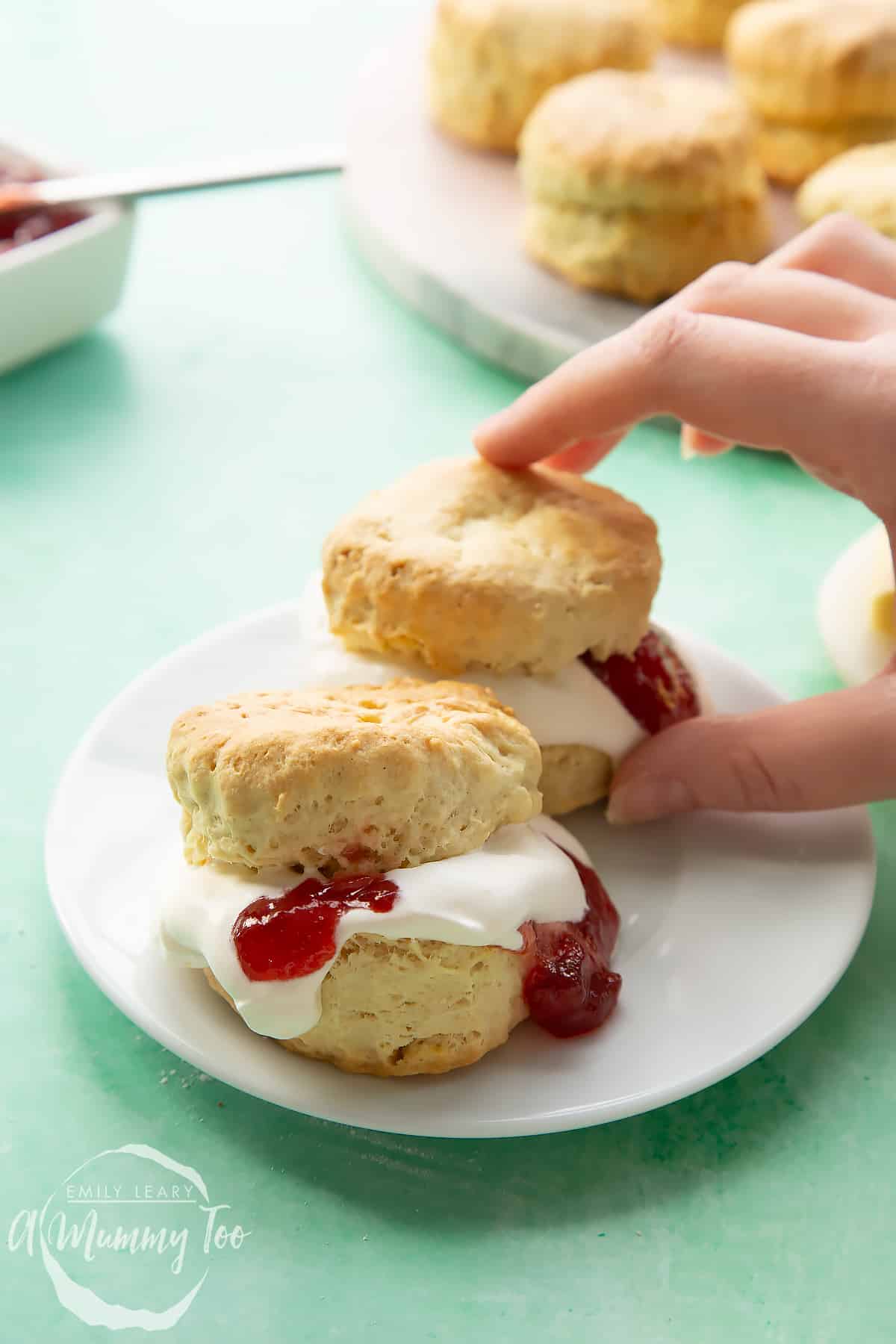
When I started out testing my vegan scones recipe, I was determined that they taste just as good as the dairy version, and I'm pleased to say that these hit the spot in every way.
The secret is using vegan butter with a high fat content of around 80%, similar to dairy butter.
You see, a lot of vegan spreads are made with quite a high water content. In fact, a popular vegan spread has just 54% fat. That might make it healthier, but it's no good for baking!
If you scroll on down to the FAQ towards the bottom of this post, you can read about some of my favourite vegan butter brands for baking.
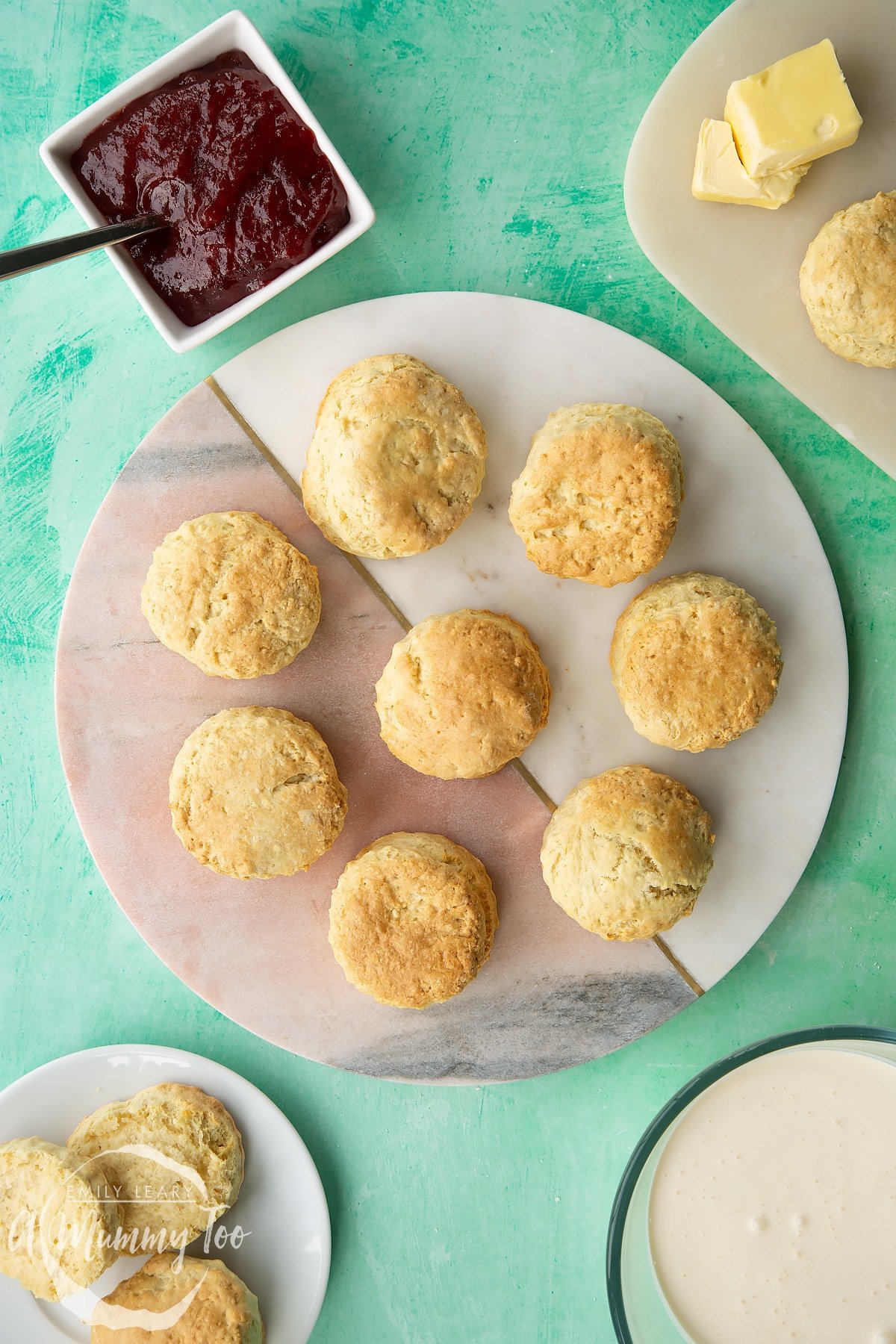
Now, back to these delicious, dairy free scones. They are super easy to make. First, you'll combine flour, sugar, salt and bicarbonate of soda, then rub in vegan butter. Once you have a crumb, you'll add your favourite vegan milk alternative and mix it together with a butter knife to give the perfect scone dough.
From there, it's just a case of gently pressing the dough into a rectangle, cutting out rounds, brushing with a little more plant milk and baking for 12 minutes puffed and golden.
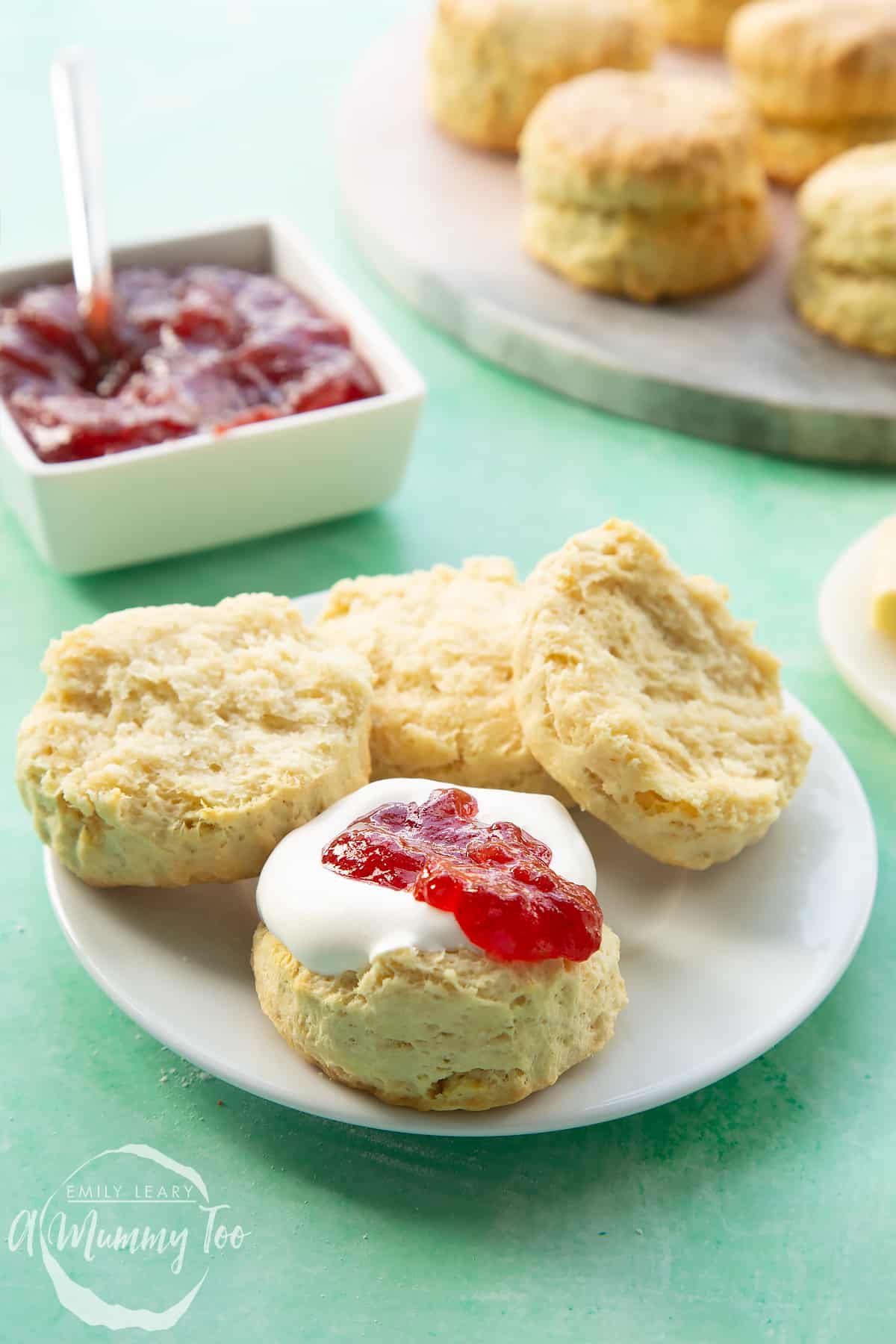
They're incredible when served warm or cold, spread with vegan butter or topped with vegan whipped cream and jam as part of a fantastic vegan cream tea.
Here's the full recipe for dairy free scones.
Ingredients
- 400 g (2⅔ cup) self-raising white flour (self rising flour) plus some for dusting
- 2 tbsp granulated white sugar
- ½ tsp salt
- ½ tsp bicarbonate of soda (baking soda)
- 100 g (7 tbsp) plant-based butter approx 80% fat, plus a little to grease
- 200 ml (¾ cup + 1 tbsp) unsweetened plant milk plus a little to brush the tops
Instructions
Preheat the oven to 200C/390F (180C/355F fan).
Measure the flour, sugar, salt and bicarbonate of soda into a bowl.
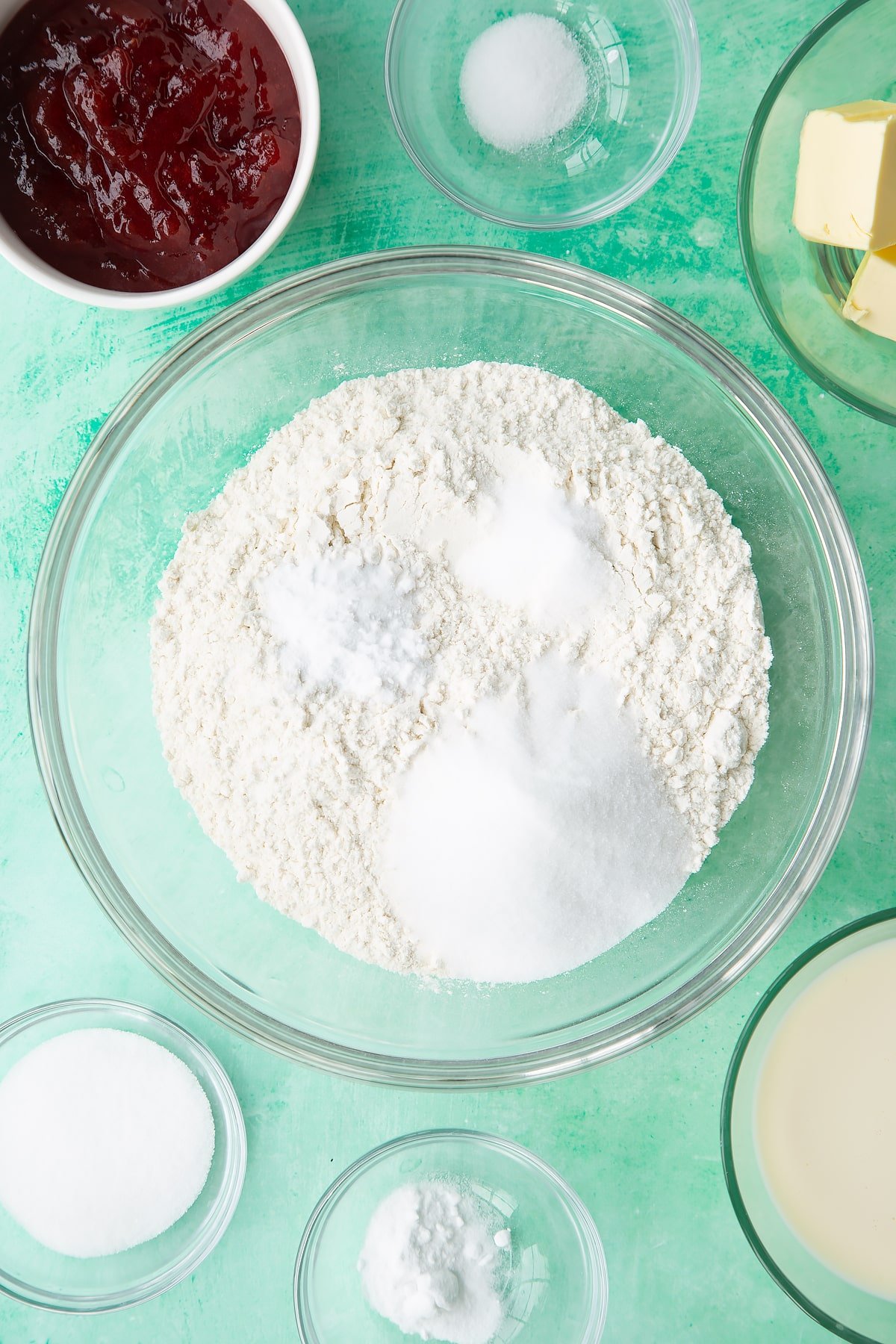
Mix together.
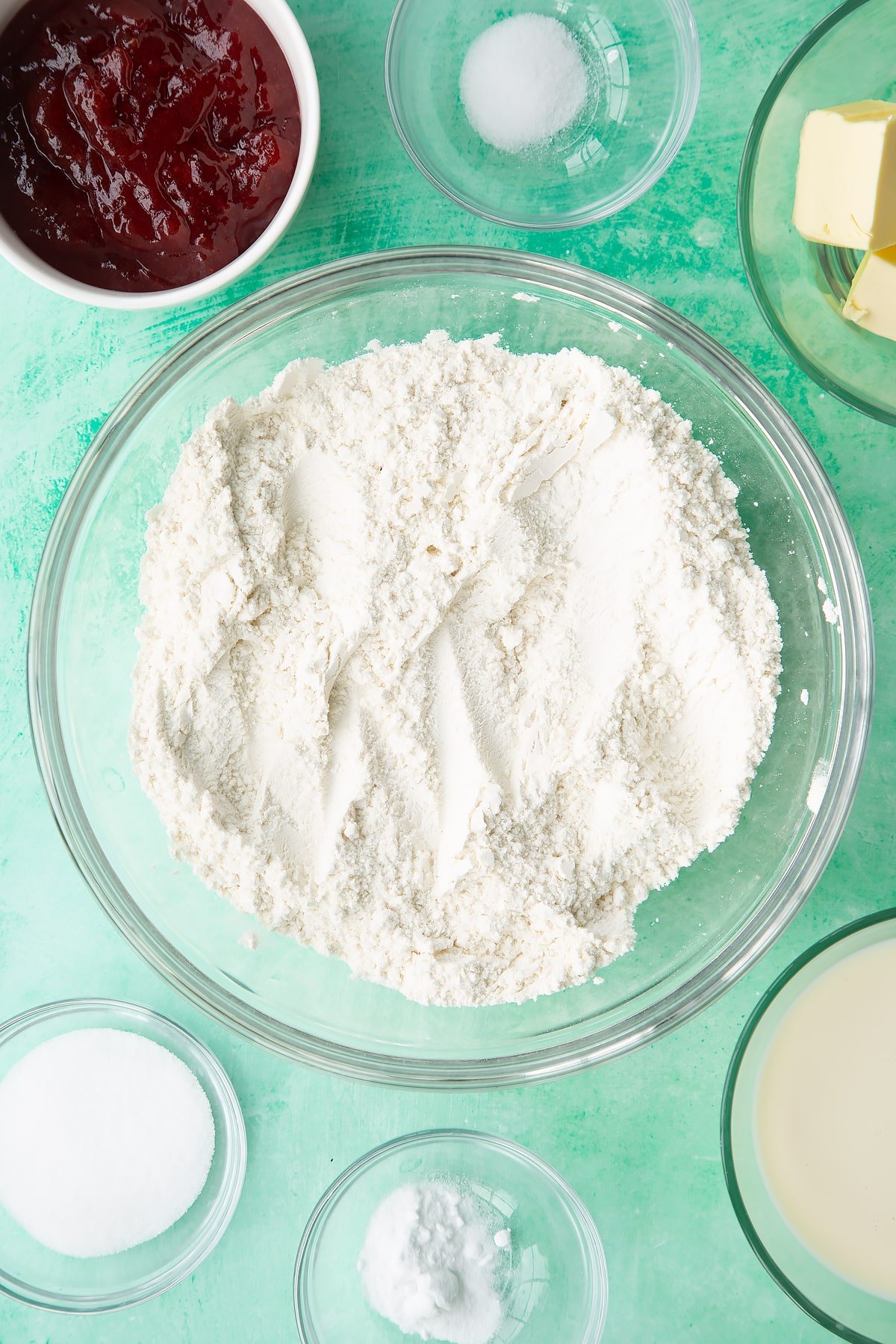
Add the cold, cubed vegan butter.
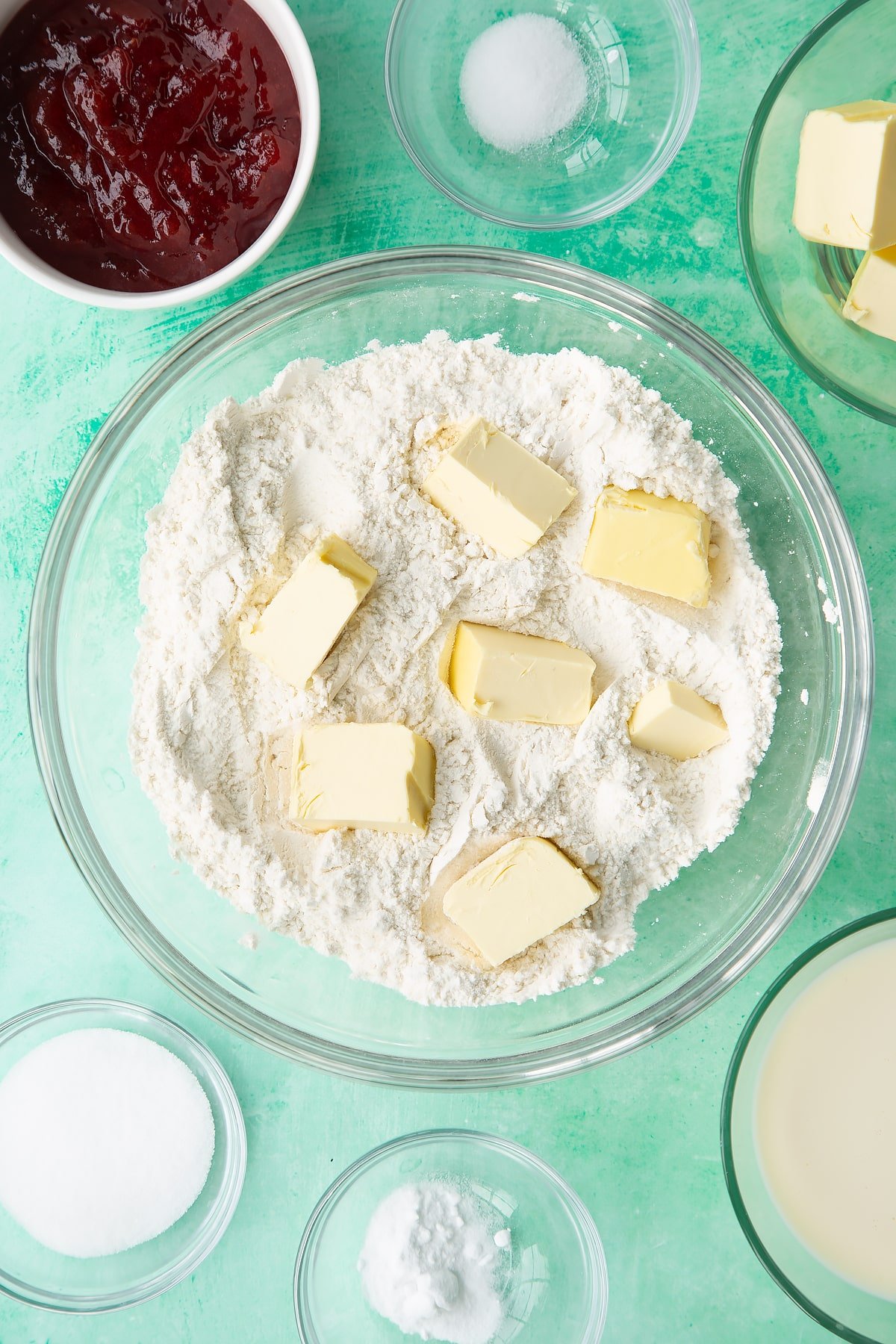
Using your hands, rub in the vegan butter until you have an even crumb.
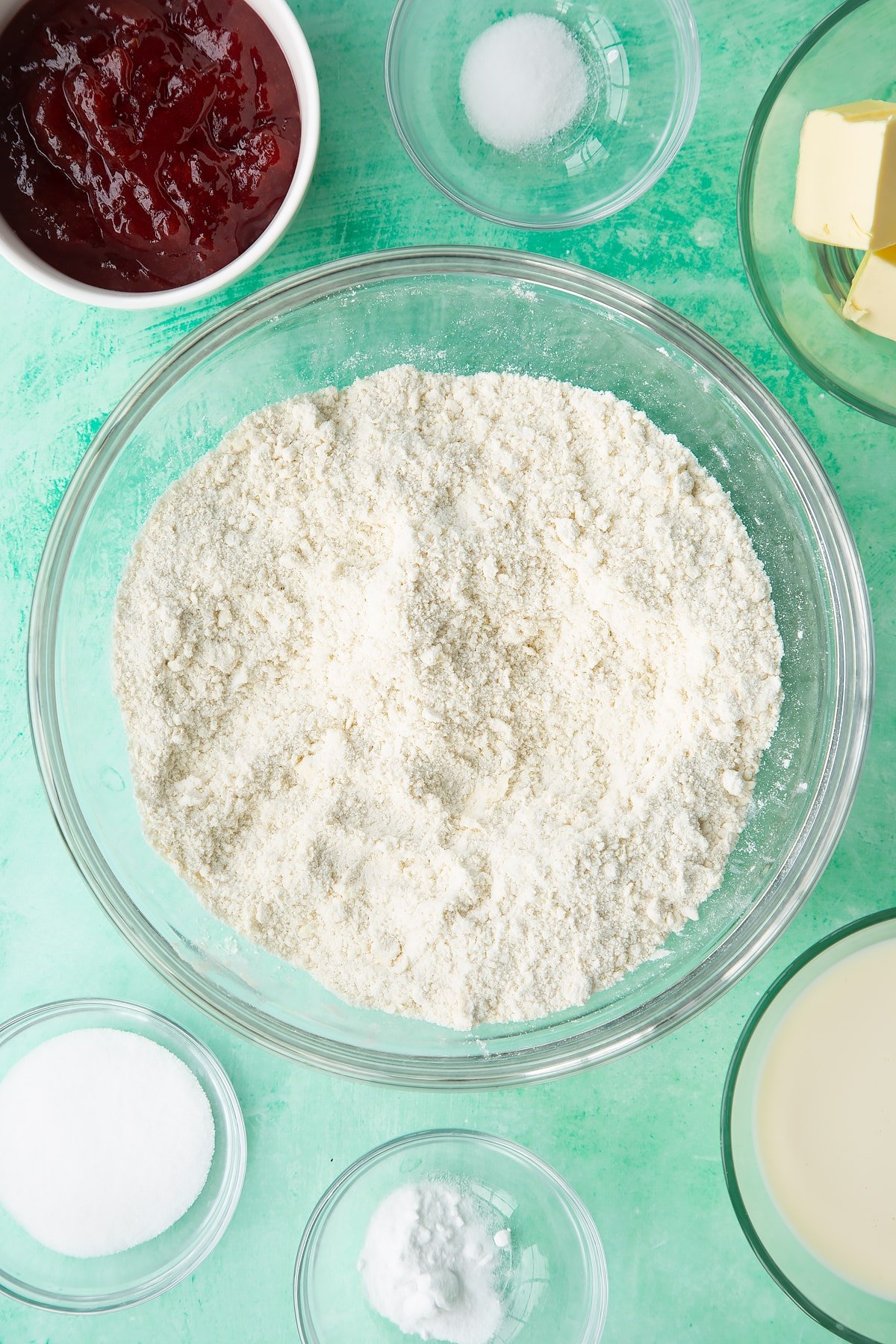
Add the plant milk.
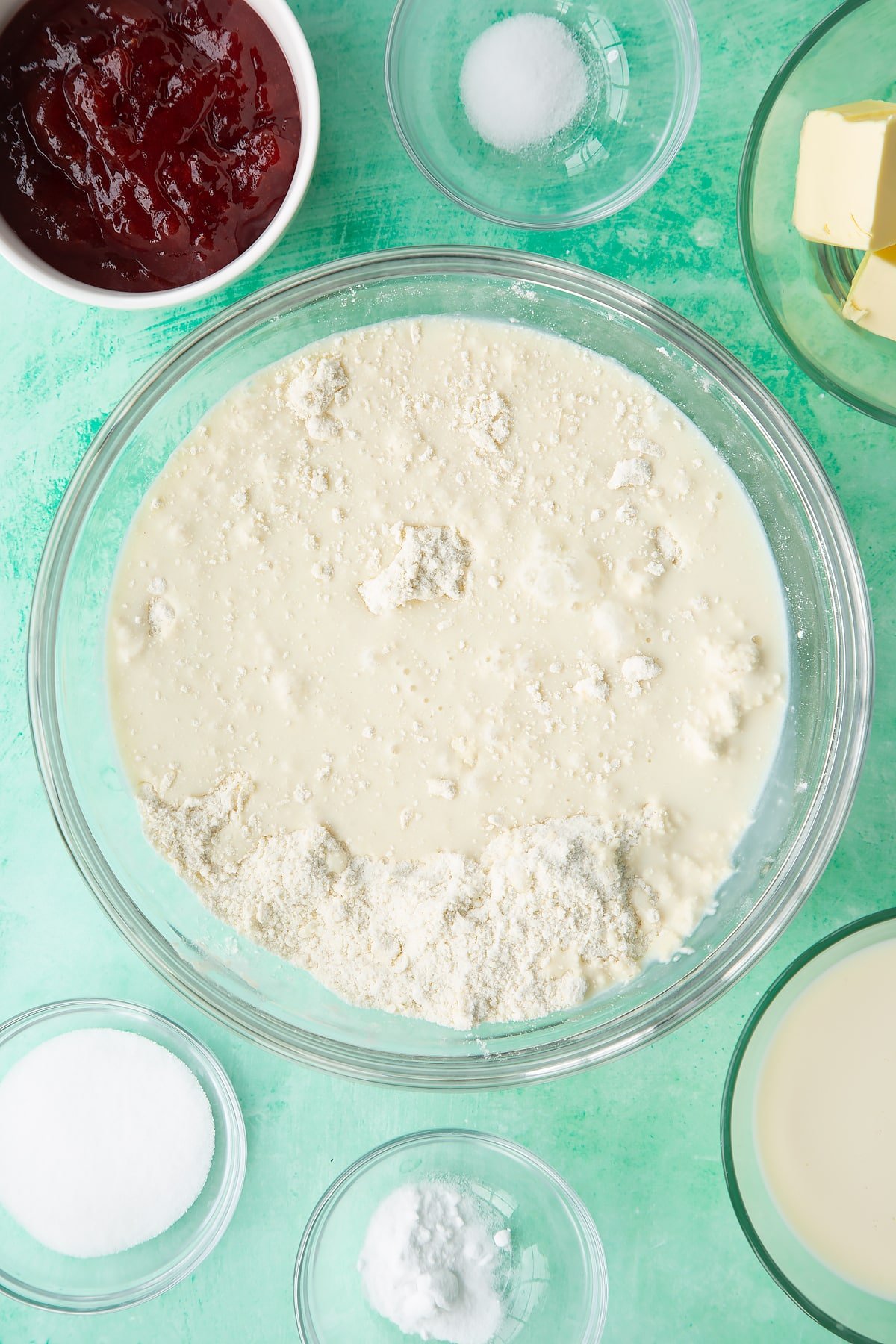
Cut the milk in using a flat knife. The mixture should start to come together.
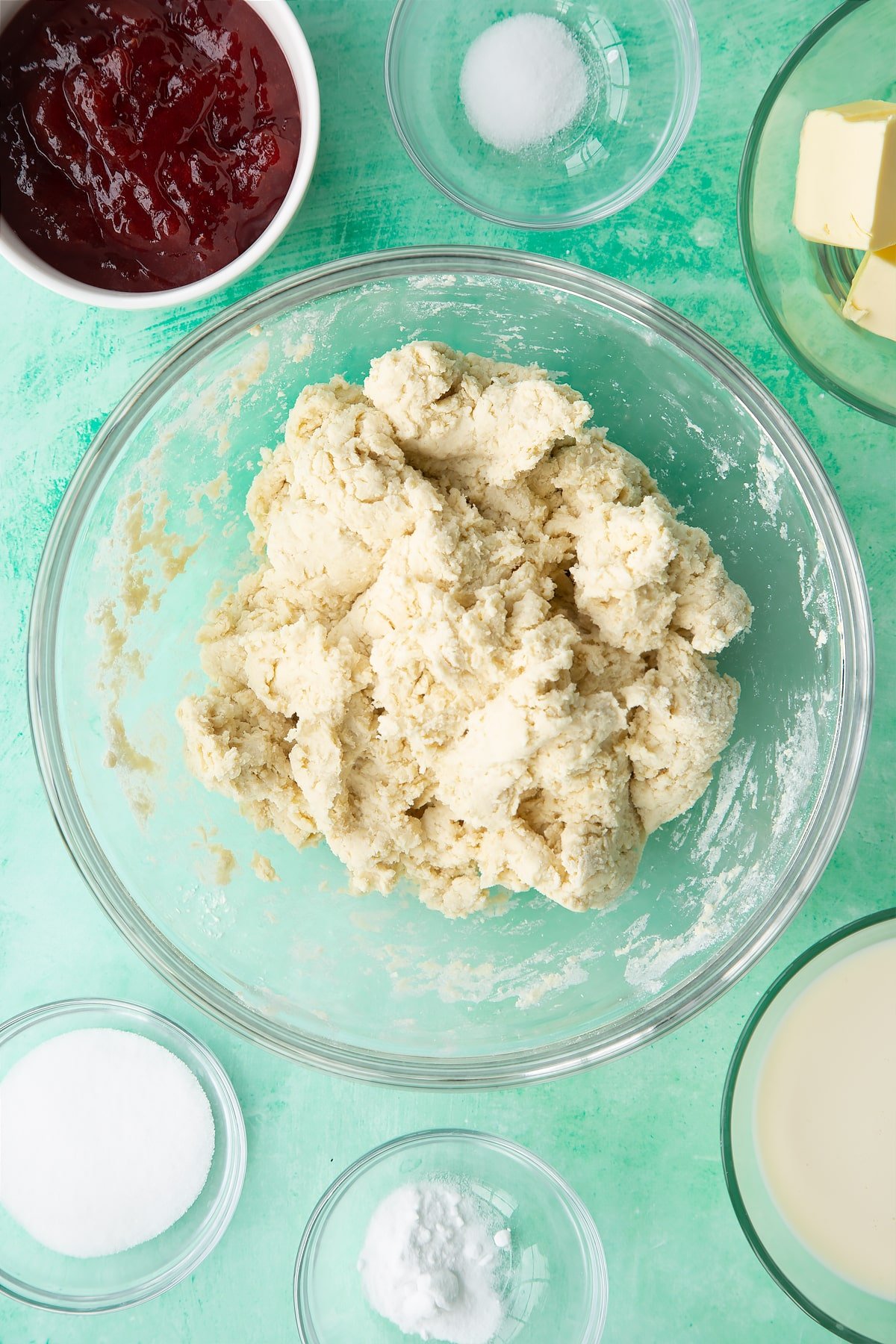
Tip the dough onto a floured surface.
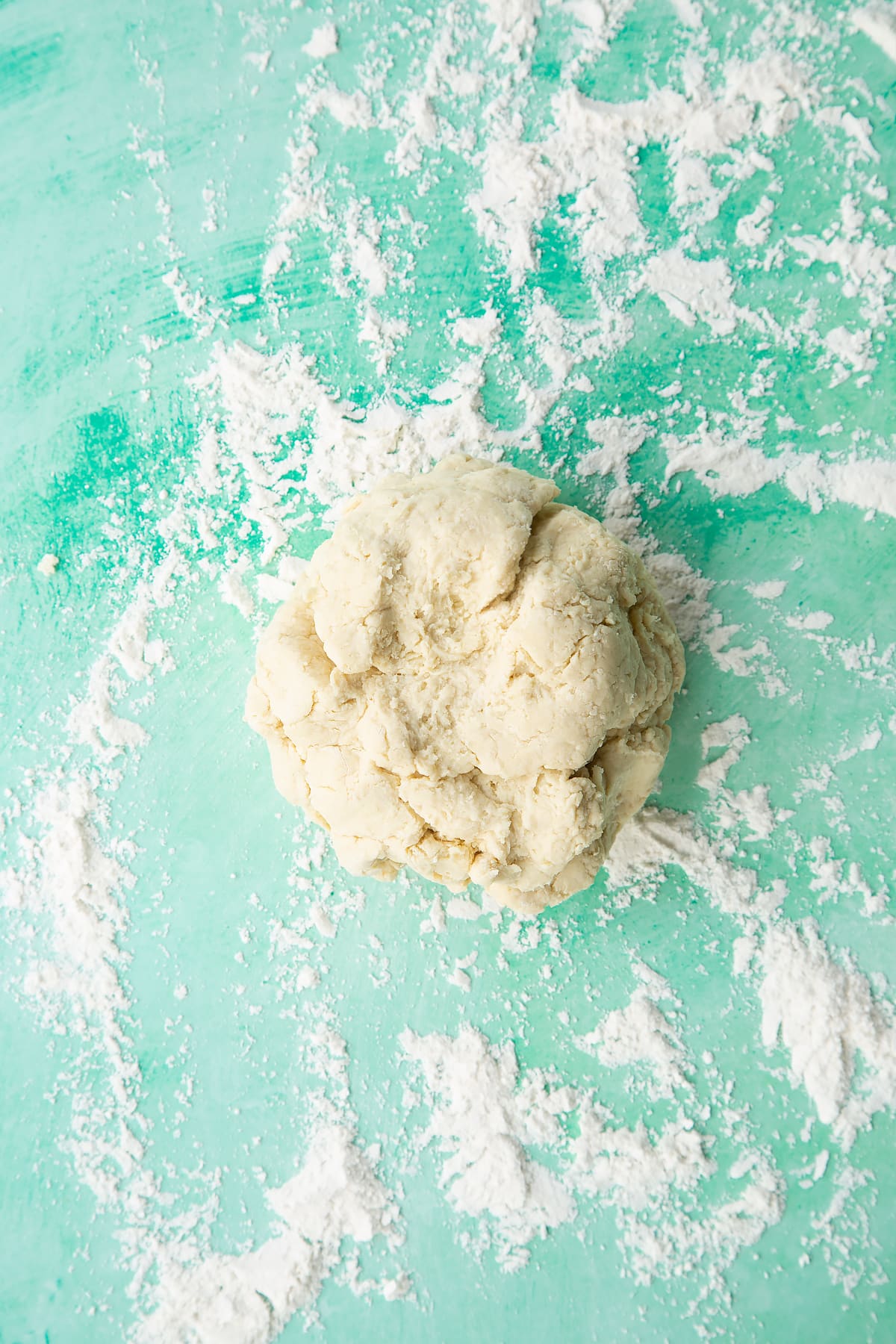
Knead very briefly – you don’t want to overwork it, just enough to bring it together. Press gently to flatten to about 2cm (¾ inch) thick.
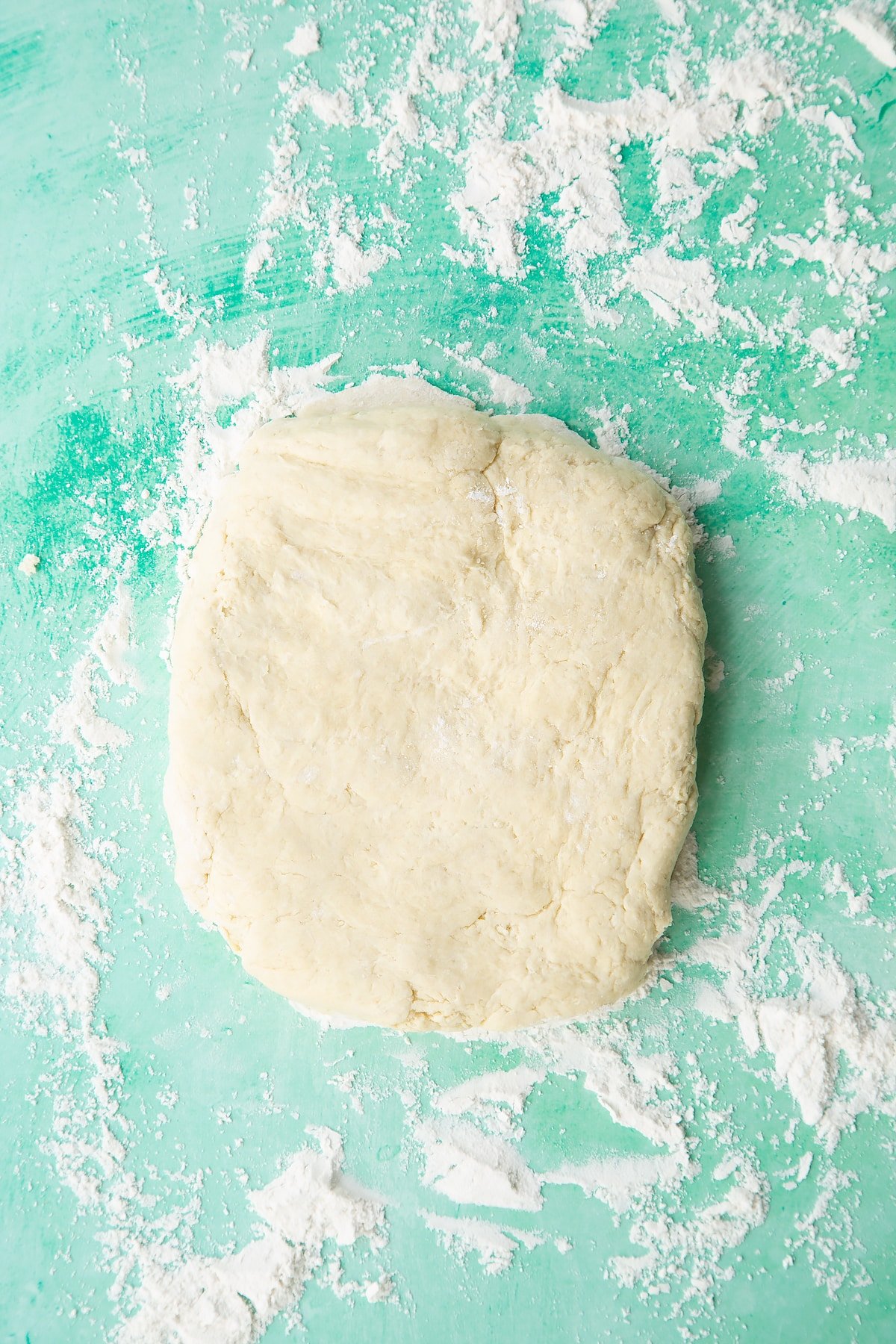
Cut out as many 5cm (2 inch) rounds as you can.
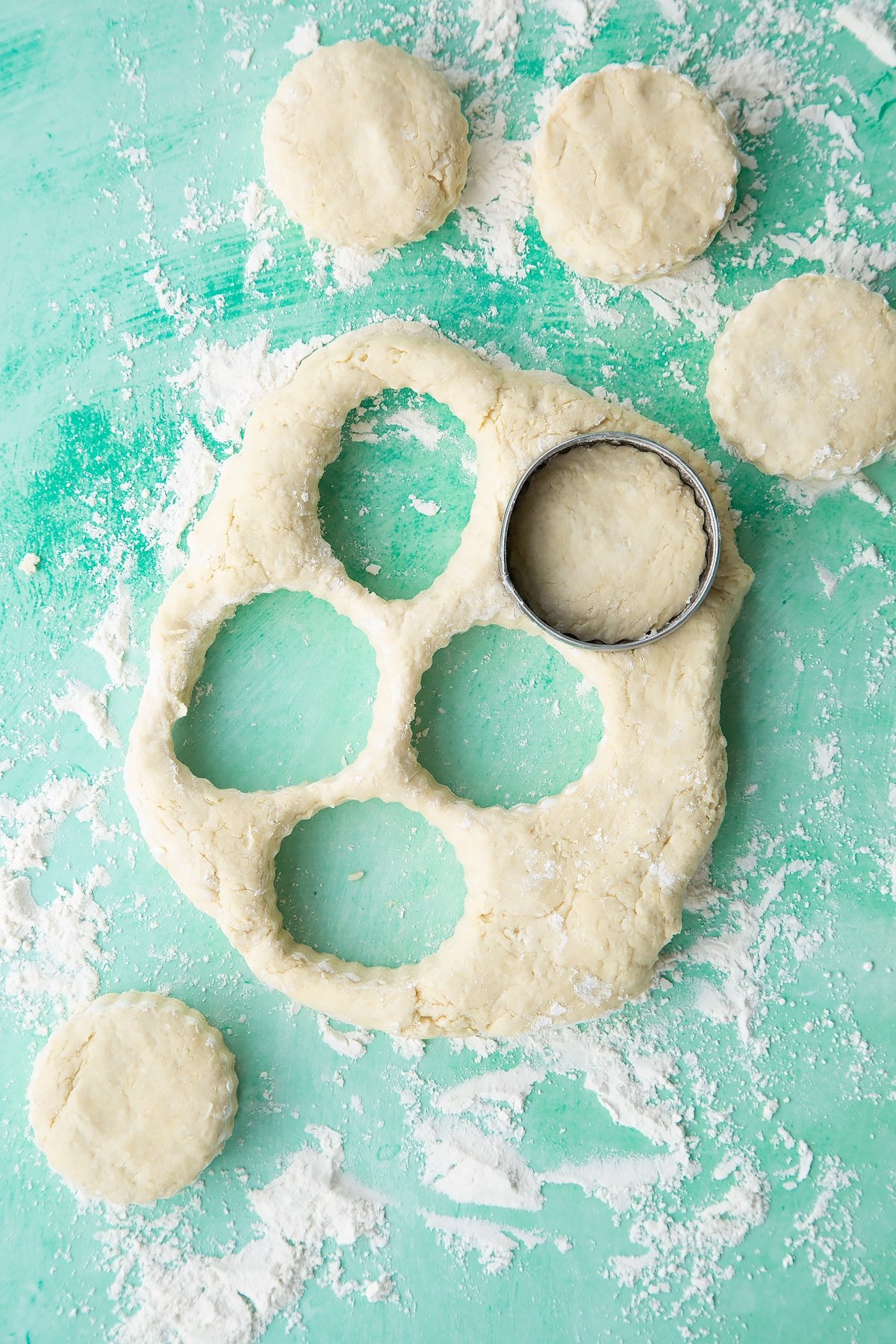
Gather the offcuts, working the dough as little as possible, and pat to flatten so that you can cut out the remaining rounds.
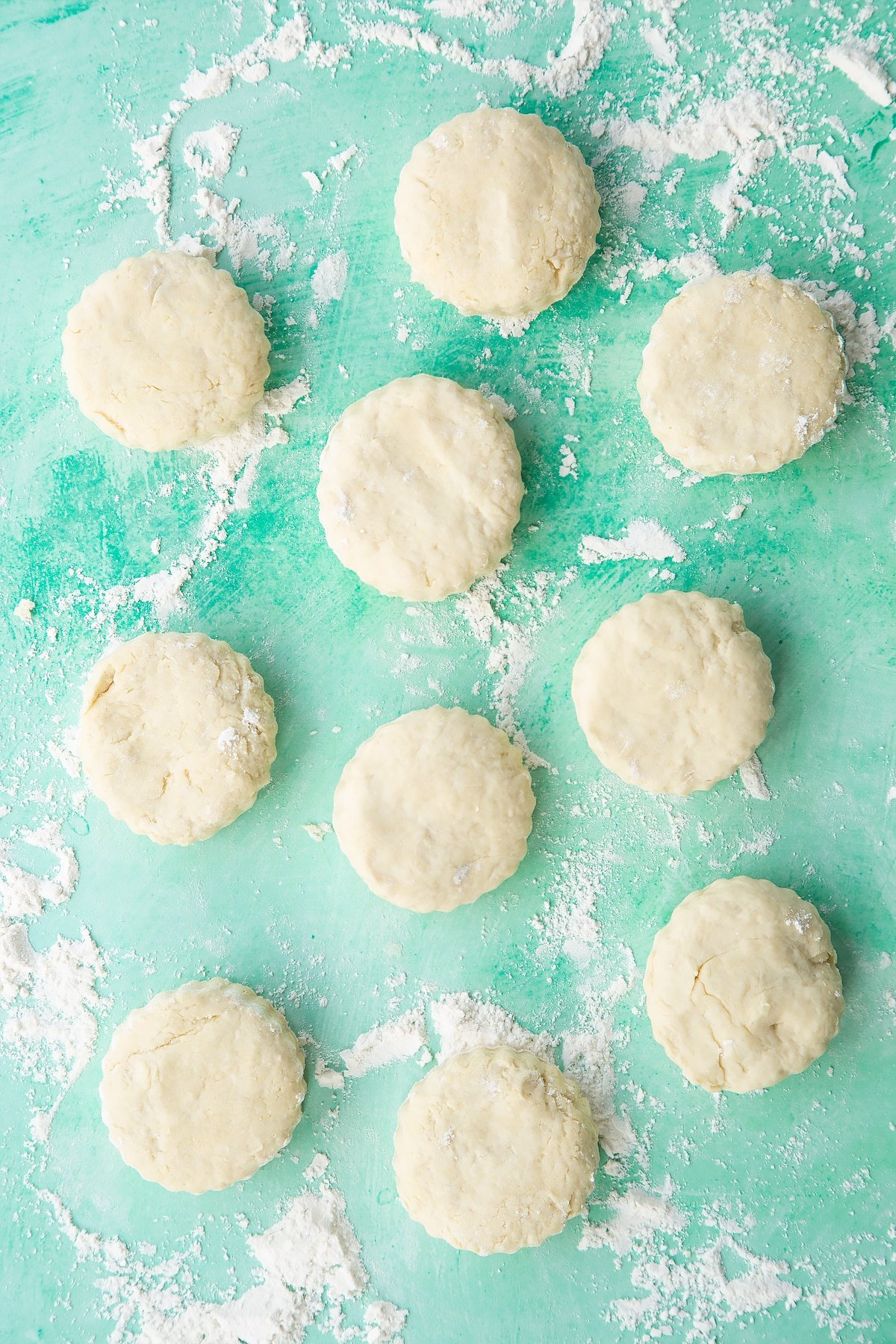
Transfer the rounds to a greased baking tray and brush the tops with plant milk.
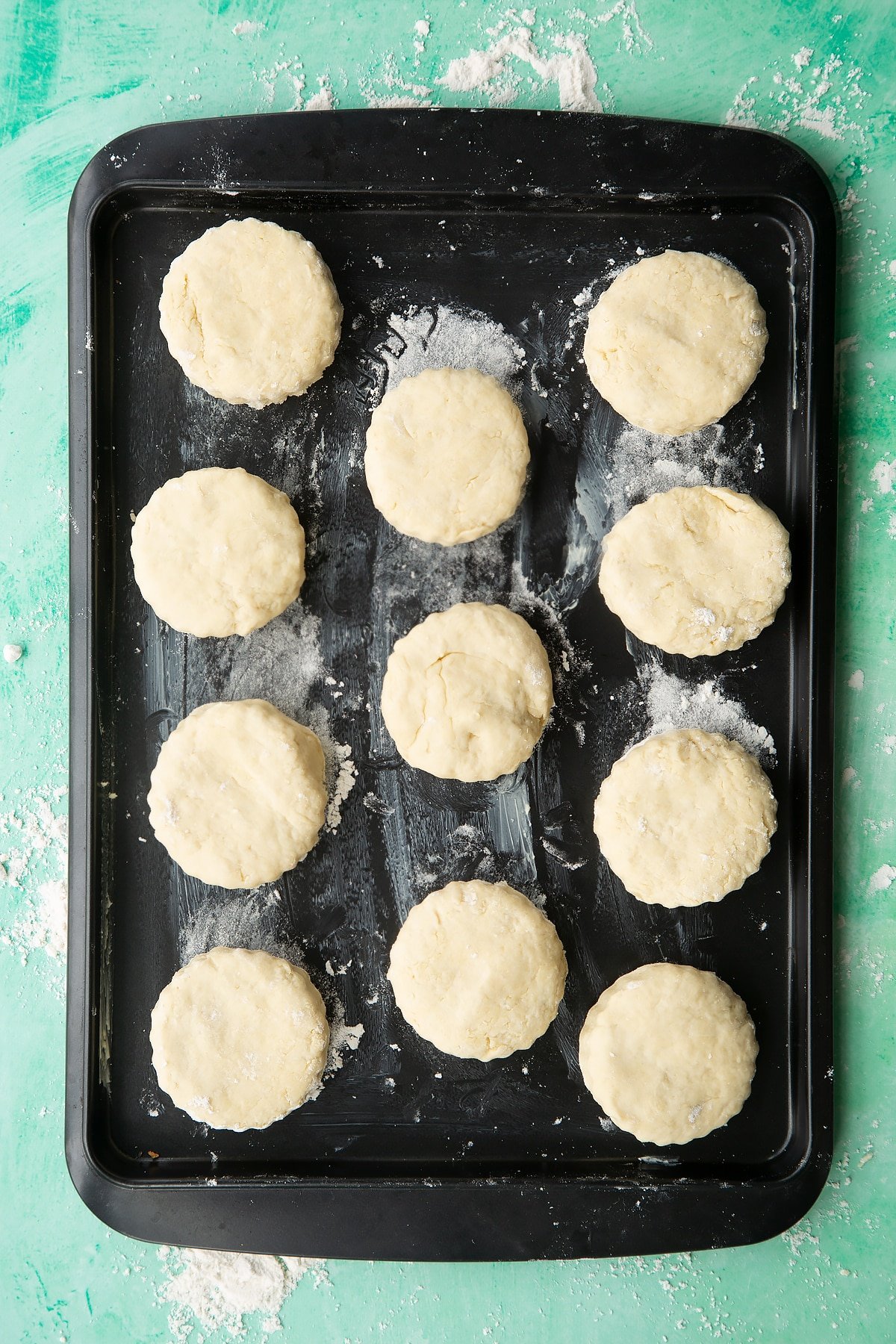
Bake for 12 minutes until the scones have puffed and turned golden.
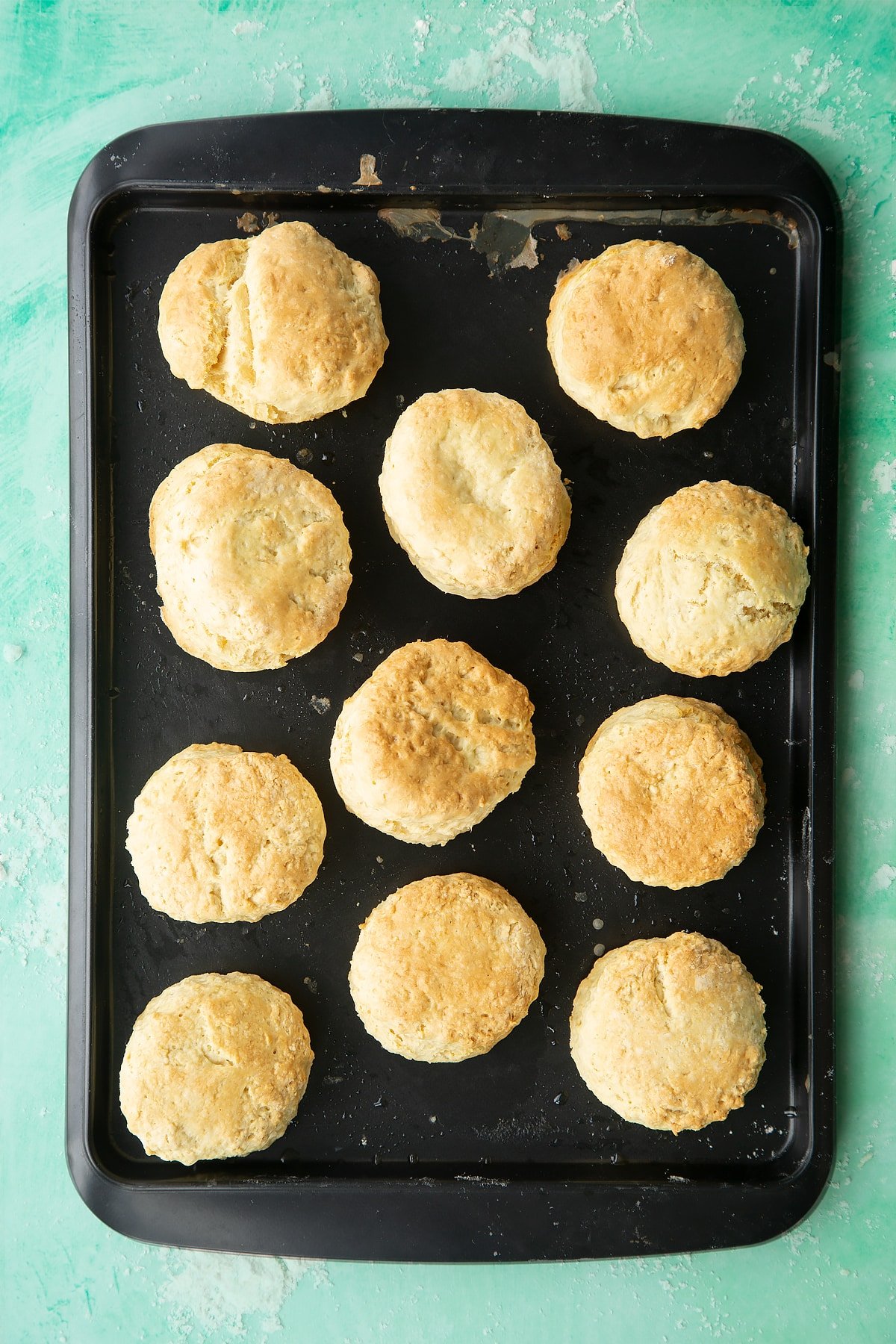
Allow them to cool completely or enjoy slightly warm. They're stunning either way!
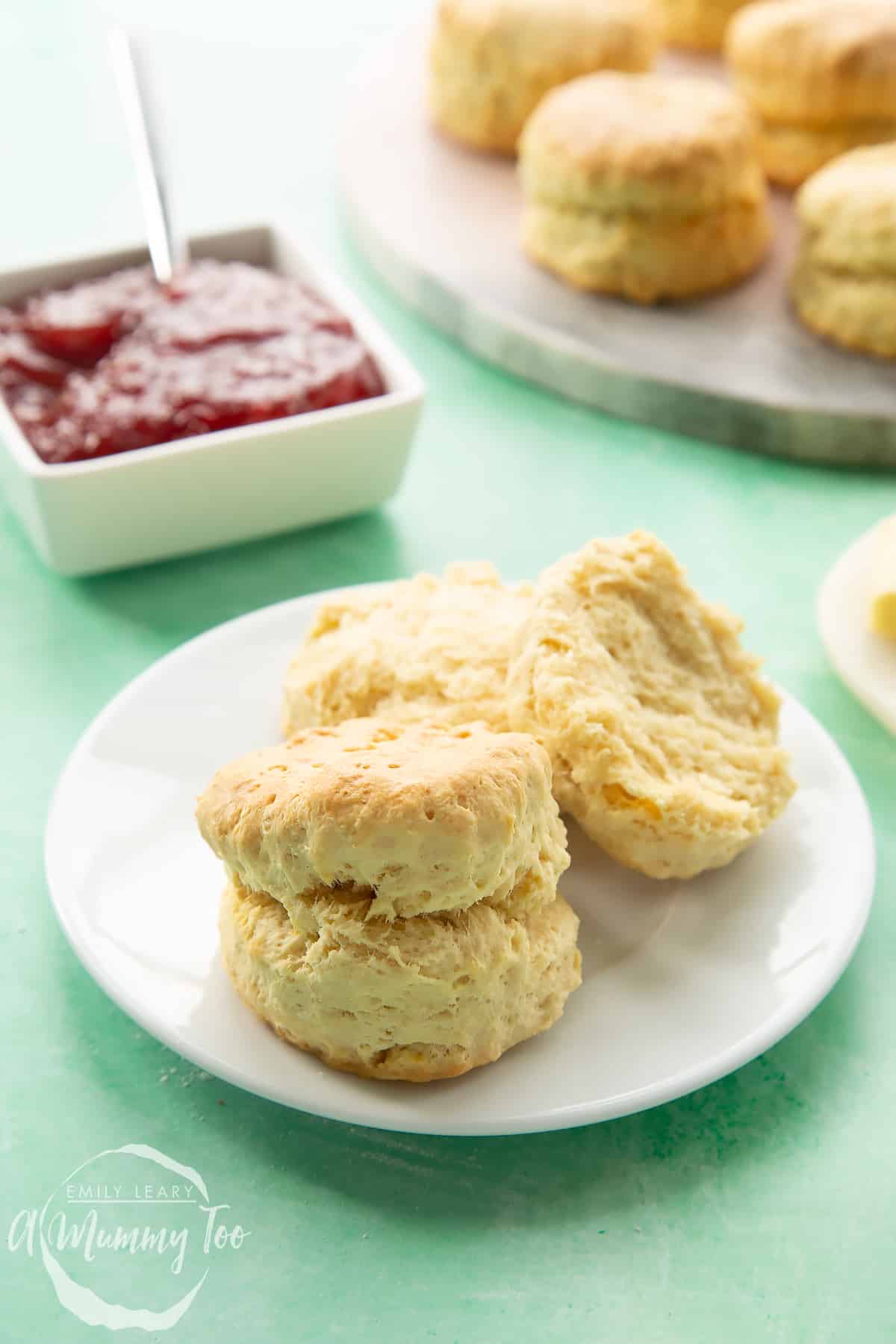
Look how beautifully they rise. Utterly delicious.
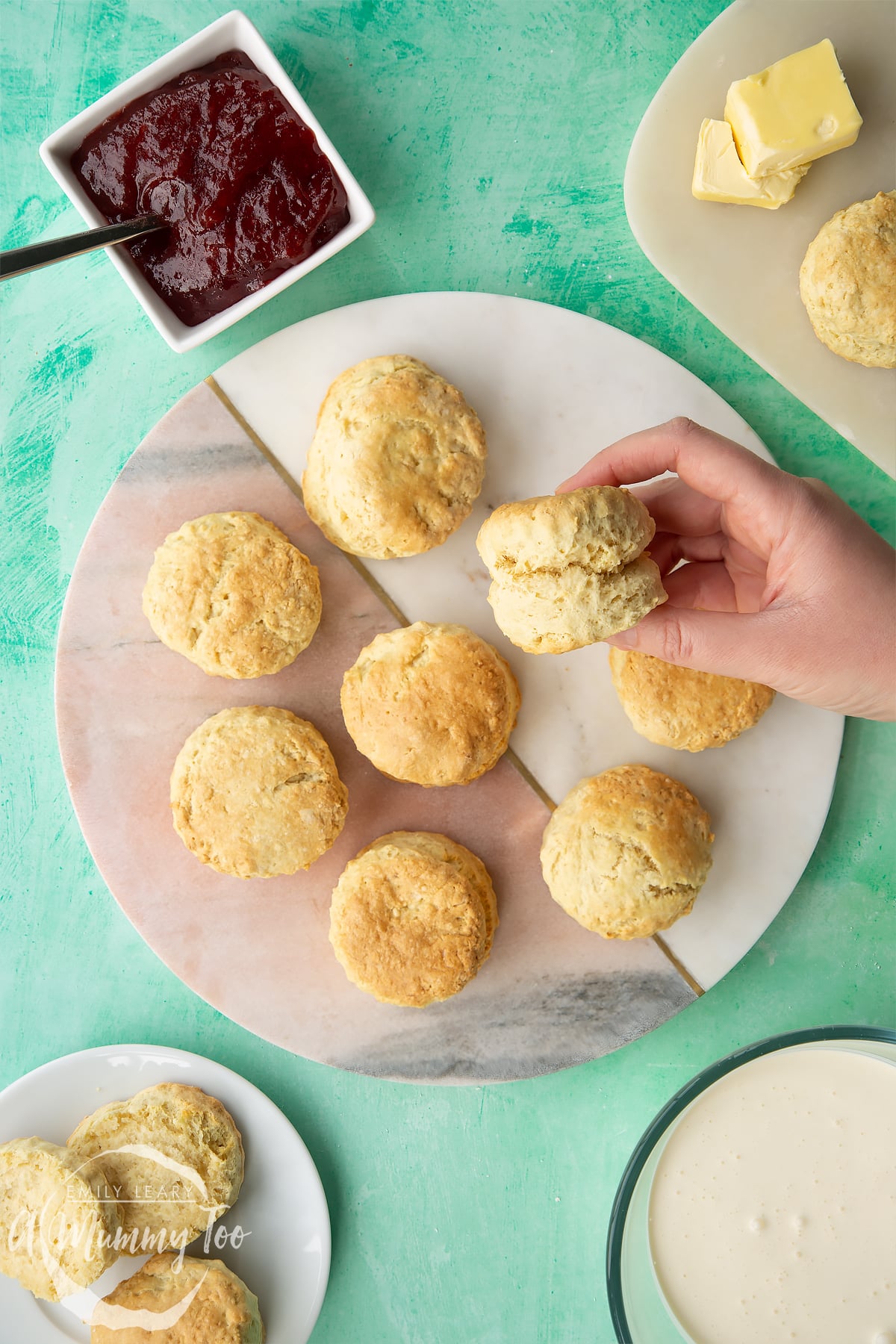
How will you serve yours?
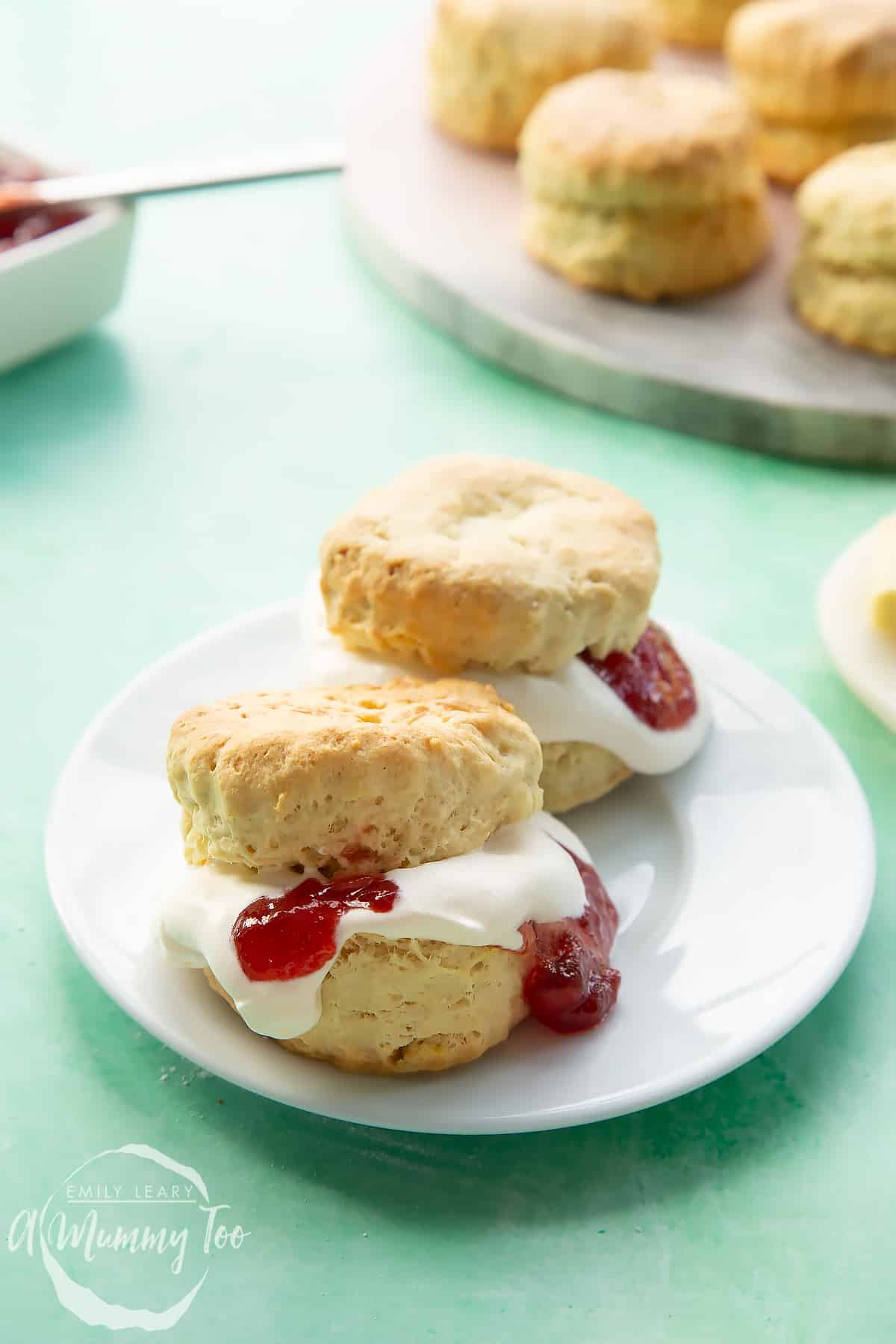
Pointers, tricks and troubleshooting tips for the perfect dairy-free scones
Are dairy-free scones easy to make?
Once you've tried this recipe and found out how easy these dairy free scones are to make, you'll be tempted to whip up a batch again and again.
With just a few simple ingredients and not much effort, you can have beautifully fresh scones with the added bonus of them being totally vegan. They only take about 10 minutes to prepare and 12 minutes to bake to perfection, so you can be enjoying your scones in no time at all.
Will I need any special equipment to make dairy free scones?
Everything you need to make these dairy free scones should be easy to find in the average kitchen. You will need scales and measuring spoons, plus a mixing bowl to combine the ingredients, and a baking sheet to cook them on.
You don't need a rolling pin as it's actually better to gently press the dough into shape so that you don't over work it.
I recommend a 5cm cookie cutter to produce your rounds, but you could use anything you have to hand, such as a drinking glass.
Alternatively, you can use your hands to shape the dough into a large round about 4cm (1.5 inch) thick and cut into 6-8 wedges like pizza slices. You can see an example of how that's done in my recipe for chilli cheese scones.
Head down to the recipe card below, where you'll find the full list of suggested equipment.
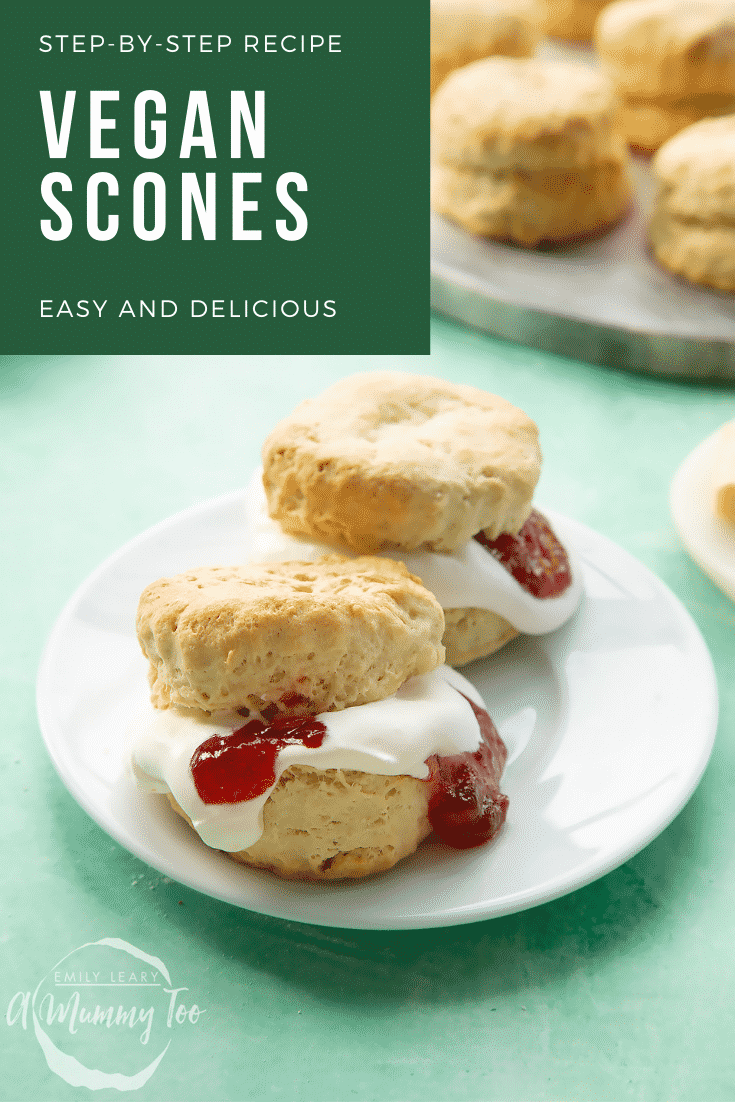
Where can I buy plant-based butter?
As with most vegan alternatives, plant based butter is becoming increasingly easy to source, so you should be able to find vegan butter in health food stores, and larger supermarkets as well as online.
When you're shopping for vegan butter, look for one with a high-fat content, around 80%, as this is similar to the amount of fat in dairy butter.
For my dairy free scones, I've used Flora Plant B+tter which works really well as it's 79% fat. Stork Original Baking Block is also pretty good in vegan baking at 75% fat.
Are dairy free scones suitable for vegetarians or vegans?
Yes! These scones are not only suitable for vegetarians, they're totally vegan-friendly, which is a joy!
Make sure to check the labels on all of your ingredients as manufacturers do sometimes change the recipes and ingredients may differ in between countries.
Also be mindful of what you serve your dairy free scones with, if you add butter or cream made from cow's milk, they'll obviously no longer be dairy-free or vegan!
In the images featured in this post, I used lightly whipped Elmlea Double Plant Cream Alternative.
Are dairy free scones gluten-free?
For these dairy free scones, I've used wheat-based self-raising flour so they are not gluten-free.
I haven't tested this recipe with gluten-free flour yet but you could give it a go. When baking with gluten-free flour I recommend using a good quality brand that will likely be a blend of things like rice and oat flour, mixed with a binding agent like xanthan gum to help with the texture and of course a raising agent.
Whenever cooking or baking for someone who needs to avoid gluten make sure to check the packaging of all ingredients to make sure they are also gluten-free and there is no risk of cross-contamination.
Are dairy free scones keto-friendly?
Each scone contains an estimated 28g of carbohydrate, which is key to the texture of the scones, so this unsuitable for a keto diet.
Are dairy free scones healthy?
Scones in themselves are not so unhealthy compared to other much sweeter bakes like cookies and cakes - they're really more of a quick bread.
Of course, if you serve with your scones with as lashings of jam and vegan cream, this will up the sugar, fat and calories, but that doesn't mean they can't be enjoyed as an occasional treat as part of a healthy, balanced diet.
At the bottom of the recipe card below, you'll see an estimate of the nutritional values for a plain scone.
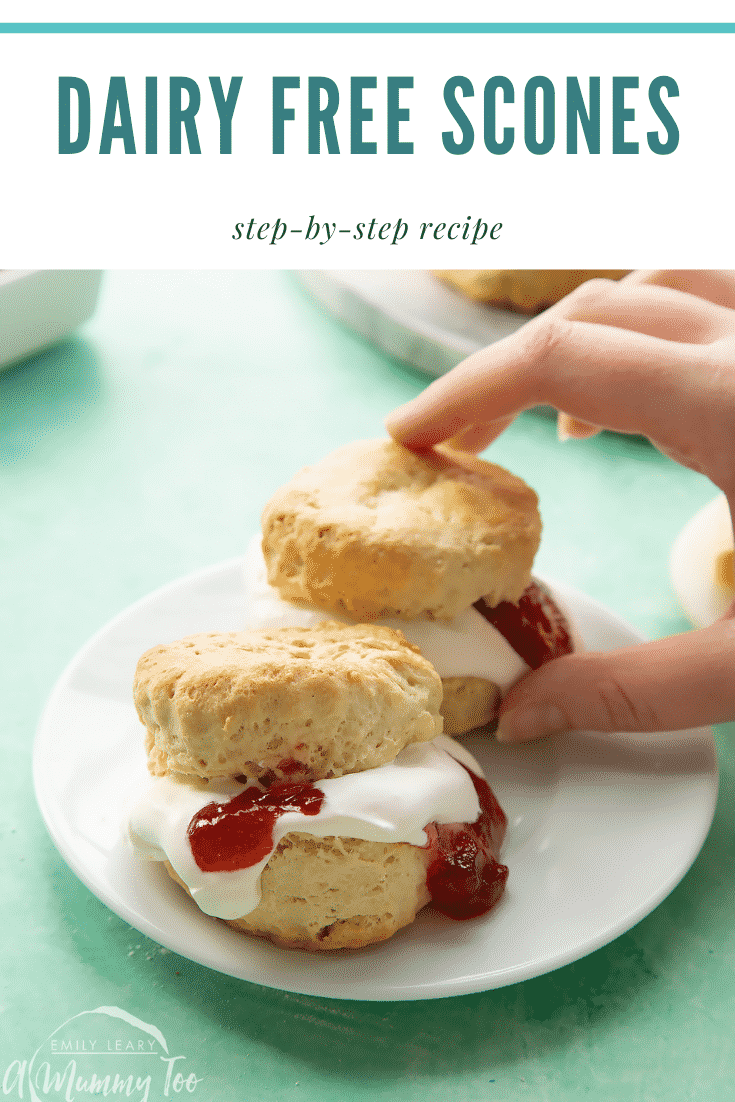
Are dairy free scones safe to eat while pregnant?
There is nothing in this recipe that should pose a risk to a pregnant woman. Make sure to check all the ingredients are in good condition, and that the scones are made safely and hygienically.
If you have any concerns please speak to a qualified health professional. A Mummy Too does not offer medical advice.
Are dairy free scones suitable for babies and toddlers?
The NHS advises not to give babies and toddlers sugar. Each scone contains an estimated 3g of sugar, which you could leave out of the recipe if you wish without compromising the flavour. You should also leave out the salt.
As long as a child is over 6 months old and has comfortably progressed to eating solid foods then these scones should be ok for them.
Obviously, the scones are adult size so cut a smaller portion to give to little ones and make sure to cut their portion into small, manageable pieces to avoid presenting a choking hazard. Keep your child upright and always supervise them when they are eating. Remember jam is usually very high in sugar so leave their scone plain, or spread a little dairy-free butter on, if you like.
The NHS website has some great resources and information. If you need more help please speak to a medical professional, A Mummy Too does not give medical advice.
What goes well with these dairy free scones?
The debates will long continue: Jam or cream first? With or without butter? And now vegans can join in the argument too!
You might like to spread your scones with vegan butter and lovely strawberry or raspberry jam. You could even whip some vegan cream if you want to make these into a classic cream tea. I used lightly whipped Elmlea Double Plant Cream Alternative.
Whatever order you like to top your scones, they're the perfect base! And of course, no cream tea would be complete without the all important pot of tea (with a dainty jug of plant milk, of course).
Can I make dairy free scones without sugar?
These scones only have 2 tbsp of sugar in the whole batch of dough, just to nudge them onto the sweet side. You can leave the sugar out if you like, but like with many breads, a touch of sugar helps bring out the flavour. However, it's not a problem if you want to enjoy these as a totally savoury treat instead!
I haven't tested this recipe with alternative sweeteners but you could give some coconut sugar a try if you like. I would avoid using any plant syrups like agave as this might make the mix too wet.
I haven’t got vegan butter, can I use vegan margarine?
This recipe hasn't been tested using vegan margarine instead of vegan butter, because margarines tend to have too much water in them.
In theory, it should work but I would really recommend using a vegan butter or baking block if you can. The higher fat content of vegan butter (aim for 80%) compared with margarine (often around 50%) means it behaves more like dairy butter, giving you lovely rich scones with a good crumb.
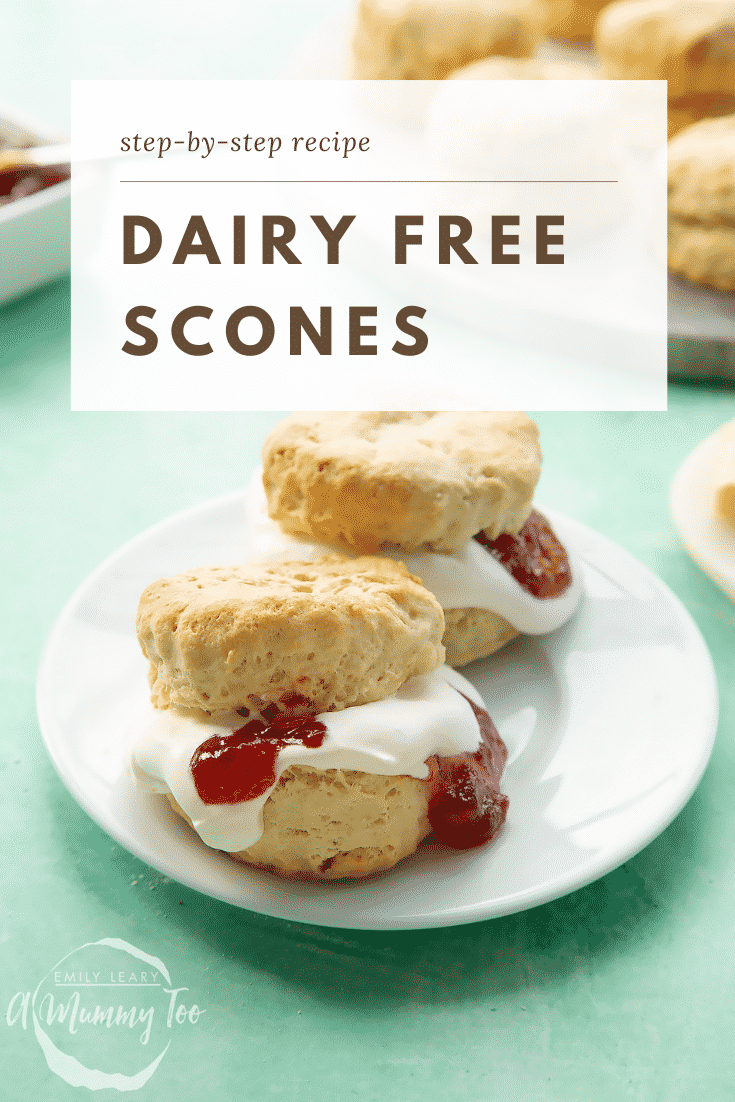
Can I add extra fruit to these dairy free scones?
I've kept these scones plain, leaving each member of the family to top them as they wish, but you can of course experiment with adding some fruit to your scones.
Dried fruit will be easiest. Try adding 50g (1.75 oz) of raisins or chopped glacé cherries, to the mix after you've created the crumb with the butter and flour and before you add the milk. This will allow you to distribute them evenly without overworking the dough.
Blueberry scones are also a winner. I haven't tested this recipe using fresh fruit but if you give it a go, please let me know how you get on in the comments below.
I estimate you'd need to wash about 100g (3.5oz) of fresh blueberries and pat dry on a clean tea towel or some kitchen paper. As with the dried fruit, add it to the mix before the plant milk.
How should I store my dairy free scones?
Once cooled, your scones will need to be kept in an airtight container to keep them fresh.
Pop your container somewhere cool and dark if you can, the pantry or in a cupboard will be perfect. You don't need to keep plain scones in the fridge.
How long do dairy free scones keep?
Personally, I prefer scones as fresh as possible and so they're usually devoured by my family on the day of baking. However, they will keep for up to 3-5 days in a sealed container. You can also wrap and freeze any extra scones on the day you bake them, and they'll keep in the freezer for up to a month.
Can I leave dairy free scones out on the counter?
No, other than when brought out for serving, these dairy free scones need to be stored in an airtight container somewhere cool. If they are left out on the side, just like dairy scones, they will quickly dry out and become hard.
Can I make dairy free scones ahead?
As with most home baking, and particularly scones, I would suggest making them on the day if you can as they are best served as fresh as possible. Still warm from the oven is a wonderful way to enjoy scones.
However, if you need to, these scones can be made the day ahead. Allow the scones to cool completely before storing them in an airtight container and placing somewhere cool.
The scones can be refreshed and warmed through before serving if you wish. See my notes below for settings and timings when reheating.
Can I keep dairy free scones in the refrigerator?
There's no need to keep scones in the fridge, simply pop any leftovers into a container and keep them in a cool cupboard.
Can I freeze dairy free scones?
These scones freeze well, and it's a great way to make them last longer.
Allow the scones to cool completely, before popping them into a freezer bag or container. Freeze your scones on the day of baking to keep them at their best. Don't forget to label the container with the date and what's inside so you can make sure to use them up within a month of freezing.
Defrost in the fridge overnight in their container, then bring to room temperature before serving, or warm in the oven, if you like.
Once defrosted consume within 24 hours and don't refreeze.
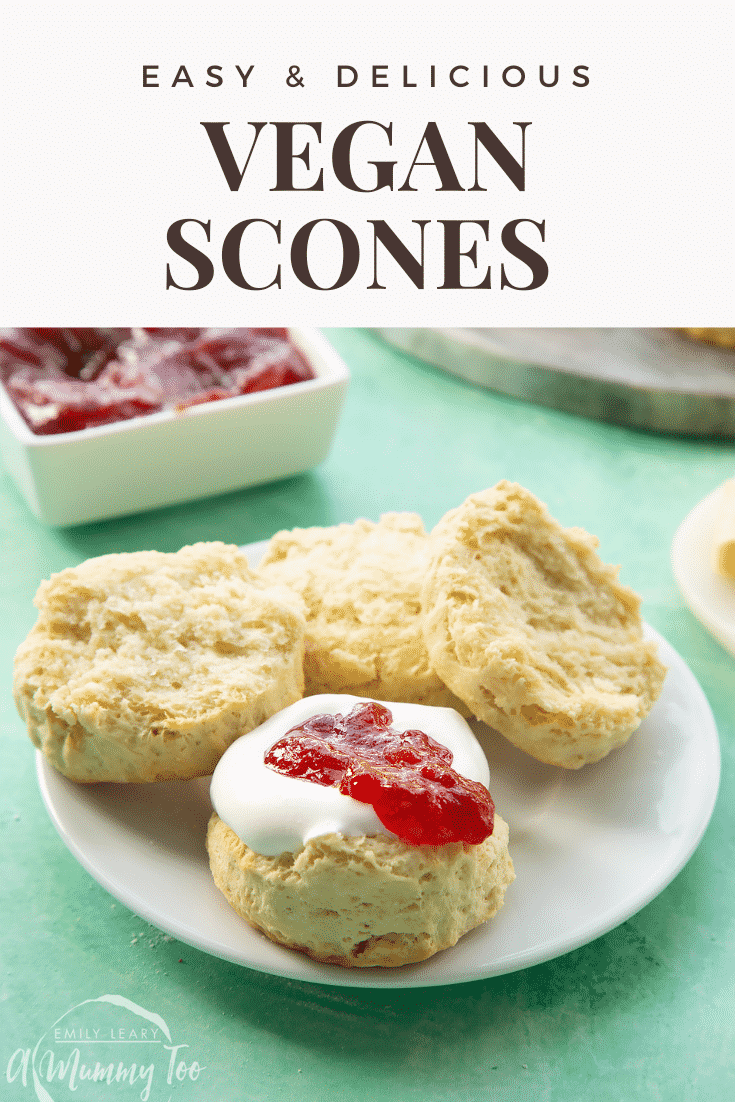
What is the best way to reheat dairy free scones?
Scones can be enjoyed both cold and warm.
To reheat your dairy free scones, preheat the oven to 180C/350F (160C fan). Once the oven has come up to temperature, pop the scone onto a baking tray and reheat in the oven for about 5 minutes until warmed through.
Can I make dairy free scones in a different quantity?
This recipe is set to make 12 scones, using a 5cm (2 inch) cookie cutter. If you would like to make more or fewer of these amazing vegan scones then you can.
On the recipe card below, near the top left, you'll see the servings are set to 12. Click on this number and a slide bar will pop up. You can then move the slider up or down to get the number of scones you would like to make. All the ingredients will update automatically so you're ready to get baking.
Can I make dairy free scones in a stand mixer such as a KitchenAid or Kenwood Mixer?
It's really important not to over mix the dough when making scones otherwise they will turn out tough and dry and not rise properly, so it's best to mix them by hand.
Once the vegan butter and flour have been rubbed together, you simply need to cut through the plant milk using a table knife, just until the dough has come together, so need to get the mixer out for this speedy bake.
Can I make these scones with a food processor?
If you find it difficult to rub the butter and flour mix by hand, you could use a food processor on pulse mode to create your crumb.
It's important to not over-mix the dough so make sure to stop as soon as your flour, vegan butter and raising agents have been blitzed to an even crumb - it should take a matter of seconds.
Once you have a crumb, tip the mixture into a bowl and lightly cut the milk through with a kitchen knife until the dough has come together. Don't use the processor for this stage.
How can I make sure my dairy free scones are perfectly cooked?
Here's a rundown of the top tips for making perfect scones:
- PREPARE: Preheat the oven and prepare the baking sheet before you start. Scones bake quickly, so oven needs to be hot when they go in.
- MIX GENTLY: Use a table knife to mix in the plant milk. This helps to not over mix the dough and keeps some of the air in that you introduced when rubbing the butter into the flour.
- BRIEFLY BRING TOGETHER: Work the dough as little as possible. Simply knead for a few seconds, just enough to bring the dough together.
- DON'T USE A ROLLING PIN: As soon as your dough has come together, press it gently into a rectangle about 2cm (¾ inch) thick. Don't press hard, you want to keep the delicate, airy scone structure intact.
- AVOID OVER-HANDLING THE DOUGH. Cut the scone rounds out as close together as you can so there's not too much excess dough to gather and flatten. Any final off-cuts can be gently gathered together to form one last wonky scone - my personal favourite!
- TIMING IS EVERYTHING: Once in the oven, your scones will take about 12 minutes to bake to perfection. They will rise and expand as they bake, and the distinct scone crack will form around the edge. You can keep an eye on them through the oven door if you like. Once they turn a lovely light golden on top, they're done.
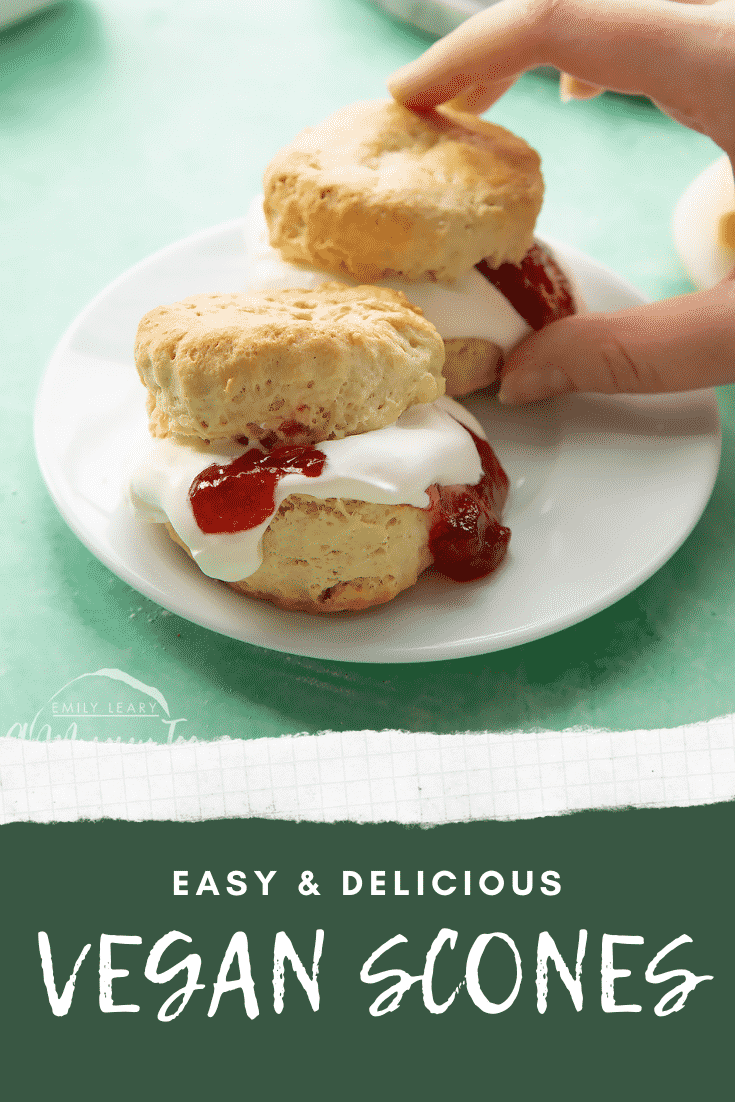
Why did my scones turn out dry and hard?
Your scones will dry out if they are left in the oven too long, or not stored correctly.
Make sure to set a timer so you remember to check on the scones, and take them out when they are risen and golden. You can cool your scones on a wire rack, and once completely cool, pop them into an airtight container to stop them from drying out so quickly.
Why did my scones turn out wet and doughy?
The dough for these dairy free scones can be a little sticky so don't worry if it's a bit wet when you first bring it together. Tip it out onto a floured surface, flour your hands and the dough should come together nicely.
If the dough is really wet, it could be that too much milk was added and perhaps the butter was very warm or too much was added. Next time, carefully measure out the milk into a jug before adding it to the rest of the ingredients. and ensure your butter is cold.
If you're pretty certain your dough has too much milk, you can cut in a touch more flour, just to make it workable but don't be tempted to add lots as this will make your scones tough.
If your scones still seem wet after the 12 minutes cooking time, you can return them to the oven for an extra few minutes, check them after 5 minutes, until they are golden on top.
Why didn’t my scones rise?
To make these scones rise we're using self-raising flour, as well as bicarbonate of soda.
When making scones, you need to move quickly and not overwork the dough. As soon as the plant milk mixes with the bicarb it will start to react and we want as much of that reaction as possible to happen in the oven.
The more the dough is worked and pulled about before it goes into the oven, the more tough the dough will become, meaning the scones will rise less and will become dense.
It's also important to preheat the oven as scones bake quickly and need to be at a constant temperature. If the oven isn't hot when the scones go in, they won't rise properly.
How can I add/change the flavours in these scones?
The easiest way to add different flavours to these scones is to use different toppings. Keep it classic with jam and vegan cream, or why not try vegan chocolate spread?
As this is a plain scone mix you can also experiment with adding extras into the scones themselves like dried or fresh fruits. Add about 50g (1.75 oz) of your chosen dried fruit, or 100g (3.5 oz) of fresh fruit just before you add the milk.
You can also turn these into savoury scones by leaving out the sugar, and spreading with vegan cream cheese to serve.
Print this recipe for dairy free scones
Dairy Free Scones Recipe
Ingredients
- 400 g (2⅔ cup) self-raising white flour (self rising flour) plus some for dusting
- 2 tbsp granulated white sugar
- ½ tsp salt
- ½ tsp bicarbonate of soda (baking soda)
- 100 g (7 tbsp) plant-based butter approx 80% fat, plus a little to grease
- 200 ml (¾ cup + 1 tbsp) unsweetened plant milk plus a little to brush the tops
Instructions
- Preheat the oven to 200C/390F (180C/355F fan).
- Measure the flour, sugar, salt and bicarbonate of soda into a bowl. Mix together.
- Add the cold, cubed vegan butter and use your hands to rub it until you have an even crumb.
- Add the plant milk. Cut in using a flat knife. The mixture should start to come together.
- Tip the dough onto a floured surface. Knead very briefly – you don’t want to overwork it, just enough to bring it together. Press gently to flatten to about 2cm (¾ inch) thick.
- Cut out as many 5cm (2 inch) rounds as you can. Gather the offcuts, working the dough as little as possible, and pat to flatten so that you can cut out the remaining rounds.
- Transfer the rounds to a greased baking tray and brush the tops with plant milk.
- Bake for 12 minutes until the scones have puffed and turned golden.
Video
Notes
Nutrition
Pin these dairy free scones
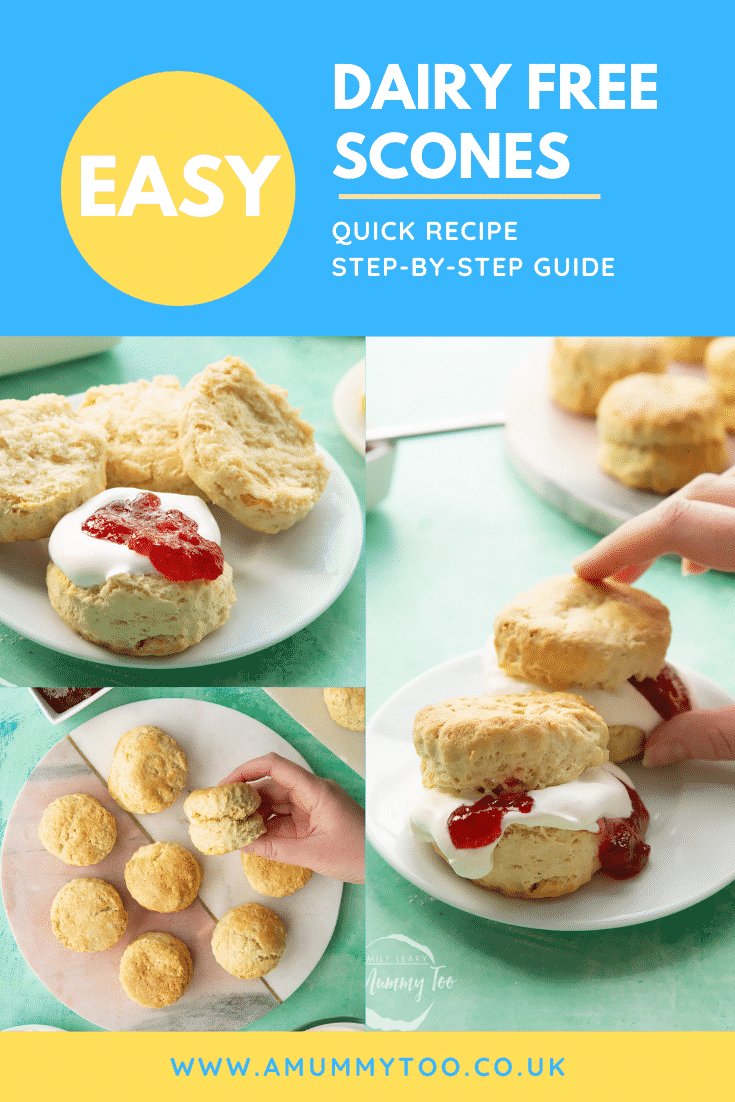
More vegan recipes to try
Have you got my book?
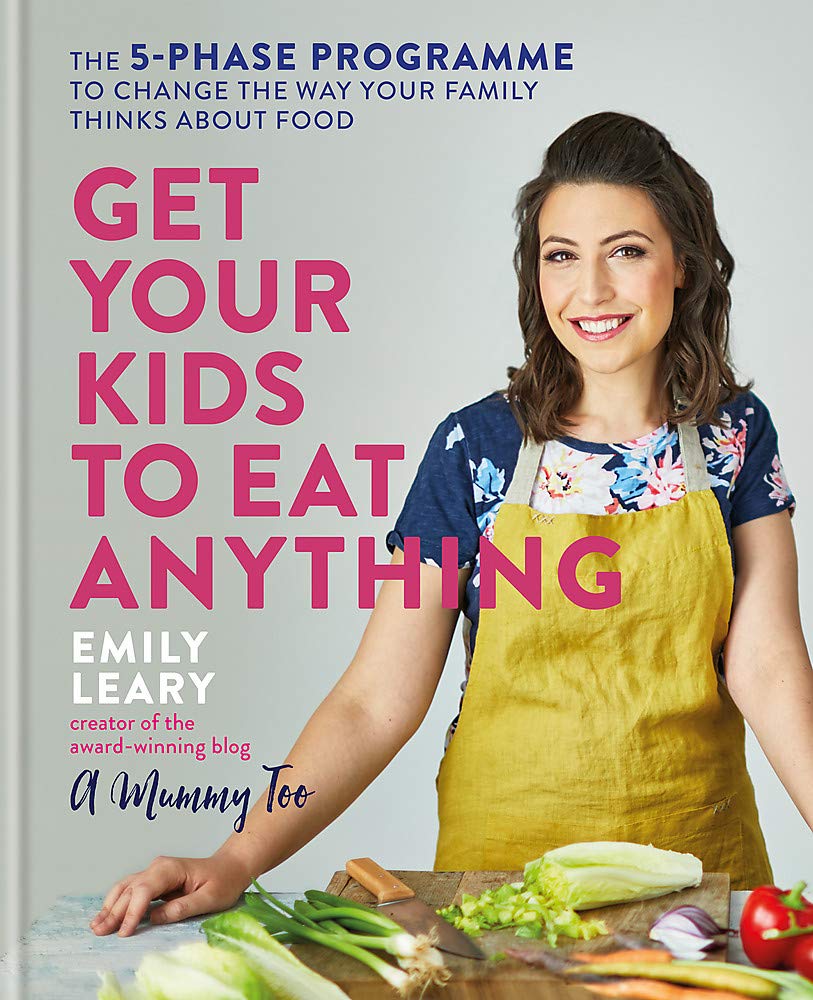
'This is a great kids cookery book. Emily is a star' - Simon Rimmer
'The book I'd like to force into any mother's kitchen' - Prue Leith
"A fab book with a plan." - Jane Devonshire, 2016 Masterchef UK winner
'Emily has managed to combine her mummy knowledge and passion for food to make a truly helpful and brilliant cookbook' - Priya Tew, RD, BSc (Hons), Msc
Get Your Kids to Eat Anything is an achievable 'how to' for parents in the battle to overcome picky eating and 'make new the norm'. Emily Leary's unique 5-phase programme looks at the issue of 'fussy eating' in a holistic way that links imagination with food, and which situates parents alongside - not in opposition to - their children.

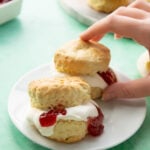
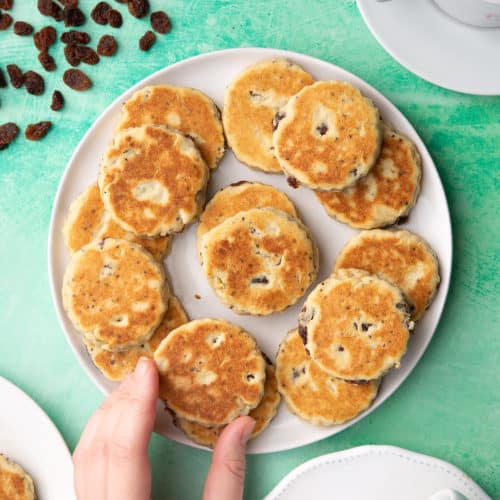
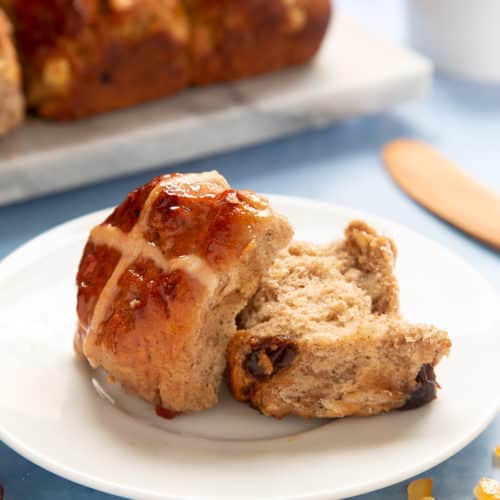
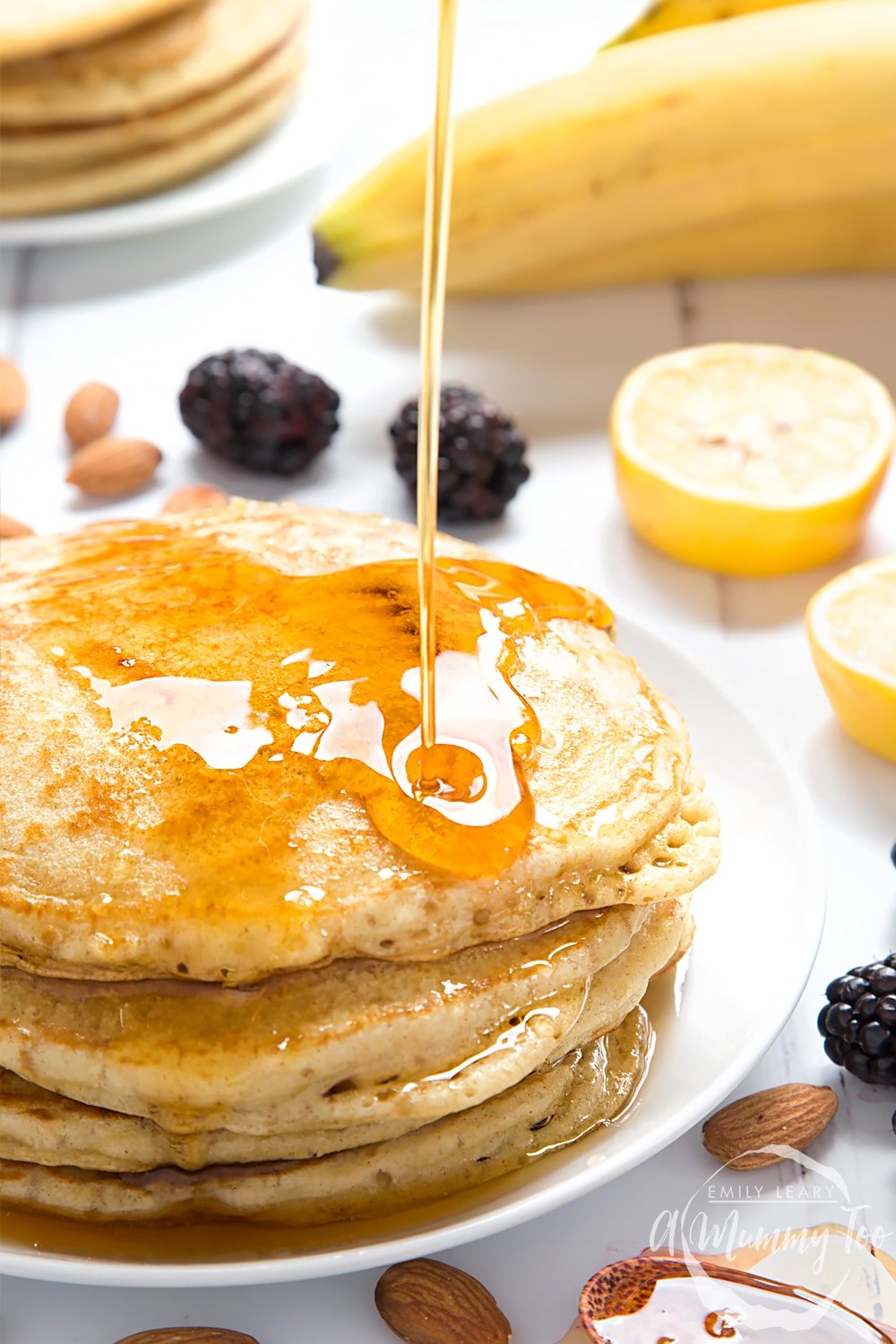
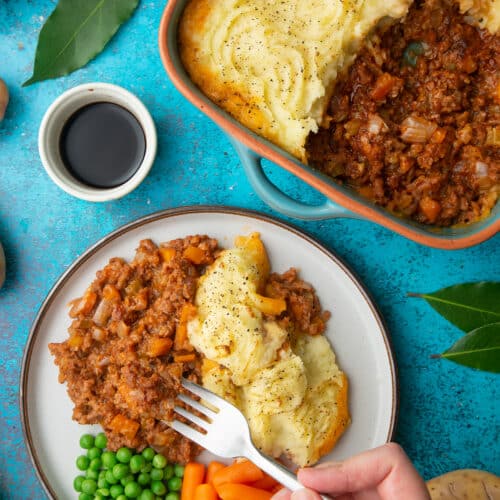
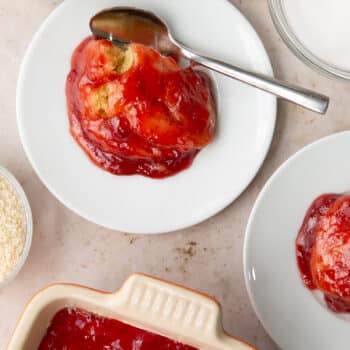
Federica says
Delicious
I changed the flour with spelt flour and rice flour.
I added the raisins to the recipe.
Anna says
Upon first try they didn't rise very well (maybe I over-worked the dough even though I tried hard not to?) but they're still delicious so will definitely be trying these again!
Seamus says
Made these in Ninja Foodie Max at 180C for the 12 minutes on bake function and delighted with results. These are going to a frequent bake, thank you. I can’t help but add a sprinkle of sugar on top after plant milk wash on top but I have a sweet tooth!
Maggie says
My family always froze the uncooked scones before baking. It was the trick to make, them fluffy and fresh. Can I freeze these after cutting before baking so I can have fluffy and fresh scones in the morning. Otherwise I do not have time to make them.
I have not made scones since my daughter and I found out dairy was making us ill.
Emily Leary says
I don't see why not! I love this idea and will be trying it too. Let me know how you get on!
Gem says
Great recipe. I tried it with vegan Margarine and it worked a treat. I also left out the sugar so my toddler could eat them too and she loved them as well. I added raisins for a bit of sweetness. I'll be making these again delicious with a bit of jam.
Emily Leary says
Wonderful! I'm so glad you enjoyed them. They're a favourite in our house too.
Fatima says
Thanks for a simple recipe. The scones baked beautifully.
Will definitely enjoy with strawberry jam and cream.
Thanks Fatima
Emily Leary says
Fantastic! Enjoy!